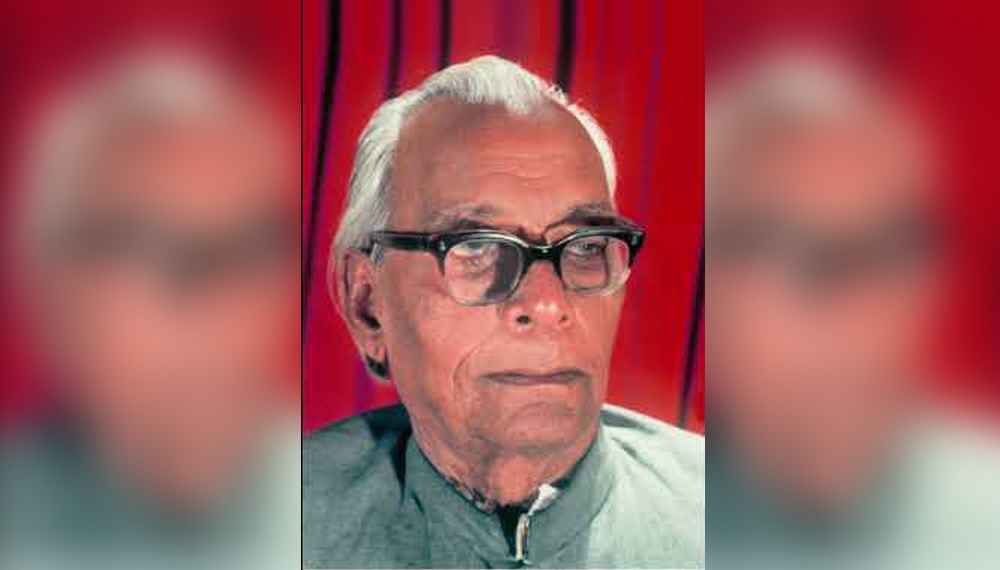Where such values as love, peace, justice, tolerance, harmony and sacrifice become practical life it naturally amounts to a harmonious blend of humane tradition and universal vision. Such are traditions of an exemplary figure who may no longer be here physically but who lives in the throbbing hearts and enlightening minds of many a silent believer in the higher values of humanity remaining gracefully attributed on his 24th death anniversary on October 30, 2015 and beyond.
This is Saba Akbar Abadi, a well known, neo-classically eastern, Urdu poet leaving a legacy of a glorious chapter in Urdu ghazal and marsia. He presented a model of an able, humble, noble and gentle disposition to be cherished. There are many different and interesting dimensions to Saba Sahib’s versatile nature. He was a man of letters without whom no mushaira or literary gathering was considered complete and from whom many sought solace, guidance and direction. A renowned poet who produced millions of thought-provoking verses in a lighter vein, being naturally and cheerfully social and sharing his ideas and vision with others indeed.
Saba translated Ghalib’s Persian quatrains and Urdu mazameen of Diwan-i-Ghalib. Born on August 14, 1908, he started thinking of poetry as a child, recited his first couplet at 11 and his literary career spread over 70 years. During this period, he wrote more than a 100,000 ghazal couplets, 72 long marsias and translated over 1200 quatrains of Omar Khayyam and the complete Persian works of Amir Khusro. Saba Sahib’s style is simple natural and beautiful in as much as it conveys his true inner feelings which appear in harmony with self, nature and humanity. His well-known publications are Auraq-i-Gul. Chiragh-i-Bahar, Sabat (ghazals) , Zikr-o-Fikr, Sarbakaf , Shahadat, Kunab (salam, marsia). Dast-e- Zar fishan and hum kalam (Rubaiyat). He had a special flair for marsia, the truly testing and trying form of poetry, in which he was regarded as the best after Mir Anees and Dabeer.
One truly remarkable Saba trait had been his true, powerful and winning humility through which he naturally made innumerable friends and exerted moral influence. The proposition “simple living, high thinking” beautifully adjusted into his scheme of things, be these personal relationships, professional pursuits, or creative writing. In his relations or dealings with different people, irrespective of their being men of letters or men at the helm of affairs or the man in the street, he always maintained a naturally impressive and persuasive soft tone and low profile. He was a man of simple cultural values with a magnetic appeal and cherished simple, warm hearted relationships. Known for his traditional hospitality he would win visitors with the simplicity and quality of reception and catering with intellectual food for thought. He believed in simple, inspiring religious and national occasions, customs, traditions, usages and conventions.
Saba Sahib played an important role in the Pakistan Movement in his own creative capacity. His father Dr. Khawaja Ali Muhammad Akbar Abadi was an office bearer of the Khilafat Committee and a member of the Congress Committee. As such, Saba’s first mushaira was chaired by Hasrat Mohani in 1919. This political link associated Saba sahib with the Muslim League and the Pakistan Movement. Through his inspiring poetry he contributed to the inculcation and promotion of the national spirit and countered adverse propaganda in this connection. His contribution towards the Pakistan Movement came in the form of three long and invigorating poems published in May 1946 as Zam Zama-i-Pakistan, dedicated to Quaid-i-Azam Muhammad Ali Jinnah. His birthday coincided with that of Pakistan which saw an ever patriotically pulsating Saba at his poetic best, producing one national poem and anthem after another. He was so engrossed in the pursuit of the higher values of life and knowledge that he forgot all about self-projection.
A man who was always thinking of poetry from a very tender age and produced huge and illuminative literary masterpieces took about half a century to get his first work published. The traumatic experience of migration from India to Pakistan and his commitment to fulfill the needs of a large family may have contributed to this. During this period he was actively occupied observing and studying various forms of literature and writing and distributing thousands of ghazals. The inner strength that he drew from faith in religion enabled him to smilingly and cheerfully brave the vagaries of life. It was with vim, vigor and vitality he produced volume after volume of humane and poetic masterpieces.
















